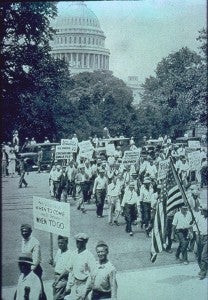Today’s post is from Bruce Lesh, a high school teacher in Maryland and author of “Why Won’t You Just Tell Us the Answer?”: Teaching Historical Thinking in Grades 7-12.
Several years ago, in the midst of changing my instructional program in order to put my high school students in the position of investigating the past, I came across the work of Roland Marchand. Tipped off by a professional colleague from California, I felt as if a door had been opened. Here, within one website, were the assiduously collected materials of a fellow history teacher who understood that students need to be immersed in the materials of the past in order to find value in its study and to develop the skills necessary to be productive members of society. Not only had Marchand collected a wide variety of historical sources, he had the foresight to organize them under thoughtful historical questions which structured their investigation. Ideas that had been germinating in my classroom coalesced as I saw how Marchand organized instruction around student debate about historical evidence. Much of the work I encountered became the basis for the historical investigations I use with my students. While exploring the site, The Bonus Army quickly drew my interest. The interplay between the following sources convinced me that the question of responsibility for the removal of the Bonus Marchers was fertile ground for my high school students to investigate:
- Excerpts from The Memoirs of Herbert Hoover: The Great Depression published in 1952.
- Excerpts from Douglas MacArthur’s Reminiscences, published in 1964.
- Statement to the press by General MacArthur, July 28.
- Excerpt from General George Van Horn Moseley’s unpublished autobiography, One Soldier’s Journey
- In At Ease: Stories I Tell To Friends (1967) Dwight D. Eisenhower
Over the years, my instinct about The Bonus Army has been rewarded with students investigating the evidence, applying that evidence to the overarching historical question, and developing interpretations substantiated with information derived from the evidence. Marchand’s Documentary Source Problems are the instructional forerunner of much of the work that has been done in history education. I still frequently find myself accessing the site for information, sources, and inspiration. My only regret is that I never got to meet Roland and pick what must have been a brain bountiful with ideas about inspirational history instruction.
Further reading:
- Examining the Past through an “Occupy” Lens
- “Occupying” the Bonus Army Protests of 1932 (Library of Congress)
Related lesson in the Marchand Collection:
From the publisher’s description of Why Won’t You Just Tell Us the Answer?”
Every major measure of students’ historical understanding since 1917 has demonstrated that students do not retain, understand, or enjoy their school experiences with history. Bruce Lesh believes that this is due to the way we teach history — lecture and memorization. Over the last fifteen years, Bruce has refined a method of teaching history that mirrors the process used by historians, where students are taught to ask questions of evidence and develop historical explanations. And now in his new book “Why Won’t You Just Tell Us the Answer?” he shows teachers how to successfully implement his methods in the classroom.
Why Won’t You Just Tell Us the Answer?” is available from IndieBound, Amazon, or directly from Stenhouse.

